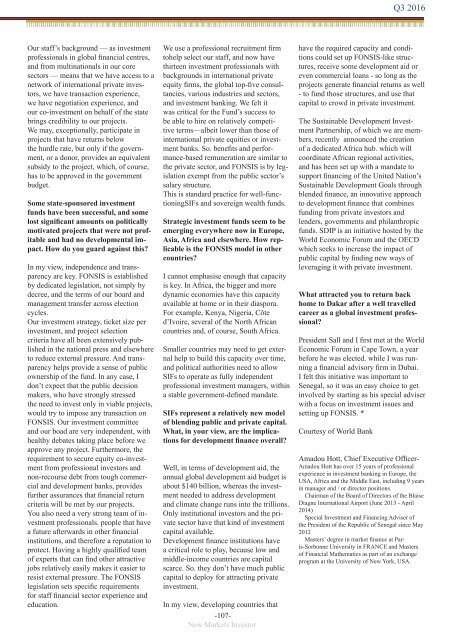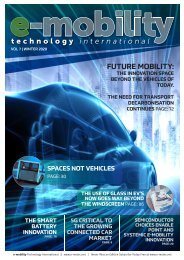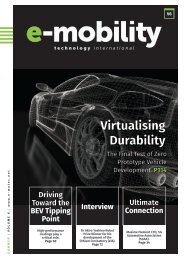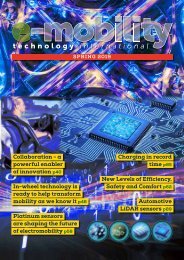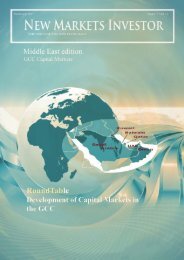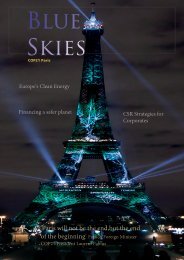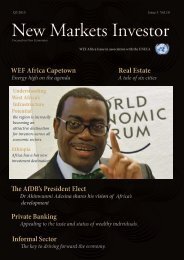Q4 2018 New Markets Investor
The magazine targets an audience of corporate and private investors, but its lucid voice makes it intelligible and essential reading for anybody who wants to understand investment strategies and markets in the 21st century.
The magazine targets an audience of corporate and private investors, but its lucid voice makes it intelligible and essential reading for anybody who wants to understand investment strategies and markets in the 21st century.
You also want an ePaper? Increase the reach of your titles
YUMPU automatically turns print PDFs into web optimized ePapers that Google loves.
Q3 2016<br />
Our staff’s background — as investment<br />
professionals in global financial centres,<br />
and from multinationals in our core<br />
sectors — means that we have access to a<br />
network of international private investors,<br />
we have transaction experience,<br />
we have negotiation experience, and<br />
our co-investment on behalf of the state<br />
brings credibility to our projects.<br />
We may, exceptionally, participate in<br />
projects that have returns below<br />
the hurdle rate, but only if the government,<br />
or a donor, provides an equivalent<br />
subsidy to the project, which, of course,<br />
has to be approved in the government<br />
budget.<br />
Some state-sponsored investment<br />
funds have been successful, and some<br />
lost significant amounts on politically<br />
motivated projects that were not profitable<br />
and had no developmental impact.<br />
How do you guard against this?<br />
In my view, independence and transparency<br />
are key. FONSIS is established<br />
by dedicated legislation, not simply by<br />
decree, and the terms of our board and<br />
management transfer across election<br />
cycles.<br />
Our investment strategy, ticket size per<br />
investment, and project selection<br />
criteria have all been extensively published<br />
in the national press and elsewhere<br />
to reduce external pressure. And transparency<br />
helps provide a sense of public<br />
ownership of the fund. In any case, I<br />
don’t expect that the public decision<br />
makers, who have strongly stressed<br />
the need to invest only in viable projects,<br />
would try to impose any transaction on<br />
FONSIS. Our investment committee<br />
and our boad are very independent, with<br />
healthy debates taking place before we<br />
approve any project. Furthermore, the<br />
requirement to secure equity co-investment<br />
from professional investors and<br />
non-recourse debt from tough commercial<br />
and development banks, provides<br />
further assurances that financial return<br />
criteria will be met by our projects.<br />
You also need a very strong team of investment<br />
professionals. people that have<br />
a future afterwards in other financial<br />
institutions, and therefore a reputation to<br />
protect. Having a highly qualified team<br />
of experts that can find other attractive<br />
jobs relatively easily makes it easier to<br />
resist external pressure. The FONSIS<br />
legislation sets specific requirements<br />
for staff financial sector experience and<br />
education.<br />
We use a professional recruitment firm<br />
tohelp select our staff, and now have<br />
thirteen investment professionals with<br />
backgrounds in international private<br />
equity firms, the global top-five consultancies,<br />
various industries and sectors,<br />
and investment banking. We felt it<br />
was critical for the Fund’s success to<br />
be able to hire on relatively competitive<br />
terms—albeit lower than those of<br />
international private equities or investment<br />
banks. So. benefits and performance-based<br />
remuneration are similar to<br />
the private sector, and FONSIS is by legislation<br />
exempt from the public sector’s<br />
salary structure.<br />
This is standard practice for well-functioningSIFs<br />
and sovereign wealth funds.<br />
Strategic investment funds seem to be<br />
emerging everywhere now in Europe,<br />
Asia, Africa and elsewhere. How replicable<br />
is the FONSIS model in other<br />
countries?<br />
I cannot emphasise enough that capacity<br />
is key. In Africa, the bigger and more<br />
dynamic economies have this capacity<br />
available at home or in their diaspora.<br />
For example, Kenya, Nigeria, Côte<br />
d’Ivoire, several of the North African<br />
countries and, of course, South Africa.<br />
Smaller countries may need to get external<br />
help to build this capacity over time,<br />
and political authorities need to allow<br />
SIFs to operate as fully independent<br />
professional investment managers, within<br />
a stable government-defined mandate.<br />
SIFs represent a relatively new model<br />
of blending public and private capital.<br />
What, in your view, are the implications<br />
for development finance overall?<br />
Well, in terms of development aid, the<br />
annual global development aid budget is<br />
about $140 billion, whereas the investment<br />
needed to address development<br />
and climate change runs into the trillions.<br />
Only institutional investors and the private<br />
sector have that kind of investment<br />
capital available.<br />
Development finance institutions have<br />
a critical role to play, because low and<br />
middle-income countries are capital<br />
scarce. So. they don’t have much public<br />
capital to deploy for attracting private<br />
investment.<br />
In my view, developing countries that<br />
-107-<br />
<strong>New</strong> <strong>Markets</strong> <strong>Investor</strong><br />
have the required capacity and conditions<br />
could set up FONSIS-like structures,<br />
receive some development aid or<br />
even commercial loans - so long as the<br />
projects generate financial returns as well<br />
- to fund those structures, and use that<br />
capital to crowd in private investment.<br />
The Sustainable Development Investment<br />
Partnership, of which we are members,<br />
recently announced the creation<br />
of a dedicated Africa hub. which will<br />
coordinate African regional activities,<br />
and has been set up with a mandate to<br />
support financing of the United Nation’s<br />
Sustainable Development Goals through<br />
blended finance, an innovative approach<br />
to development finance that combines<br />
funding from private investors and<br />
lenders, governments and philanthropic<br />
funds. SDIP is an initiative hosted by the<br />
World Economic Forum and the OECD<br />
which seeks to increase the impact of<br />
public capital by finding new ways of<br />
leveraging it with private investment.<br />
What attracted you to return back<br />
home to Dakar after a well travelled<br />
career as a global investment professional?<br />
President Sall and I first met at the World<br />
Economic Forum in Cape Town, a year<br />
before he was elected. while I was running<br />
a financial advisory firm in Dubai.<br />
I felt this initiative was important to<br />
Senegal, so it was an easy choice to get<br />
involved by starting as his special adviser<br />
with a focus on investment issues and<br />
setting up FONSIS. *<br />
Courtesy of World Bank<br />
Amadou Hott, Chief Executive Officer-<br />
Amadou Hott has over 15 years of professional<br />
experience in investment banking in Europe, the<br />
USA, Africa and the Middle East, including 9 years<br />
in manager and / or director positions.<br />
Chairman of the Board of Directors of the Blaise<br />
Diagne International Airport (June 2013 - April<br />
2014)<br />
Special Investment and Financing Adviser of<br />
the President of the Republic of Senegal since May<br />
2012<br />
Masters’ degree in market finance at Paris-Sorbonne<br />
University in FRANCE and Masters<br />
of Financial Mathematics as part of an exchange<br />
program at the University of <strong>New</strong> York, USA.


